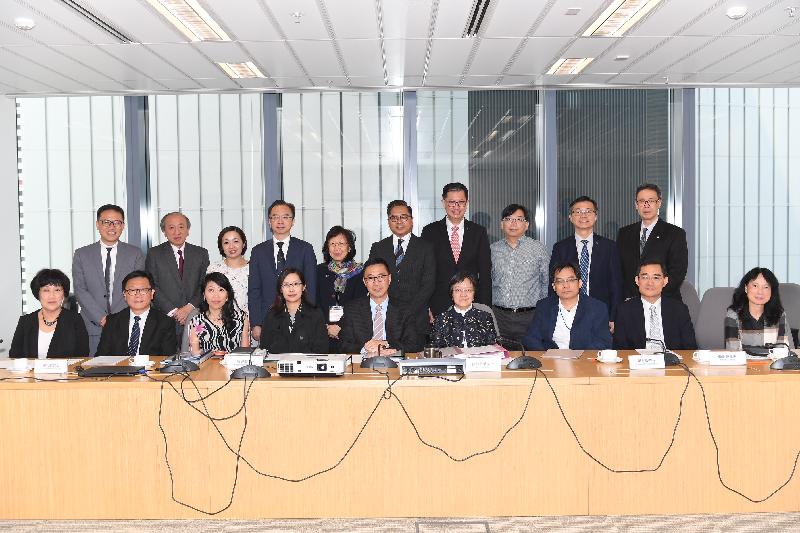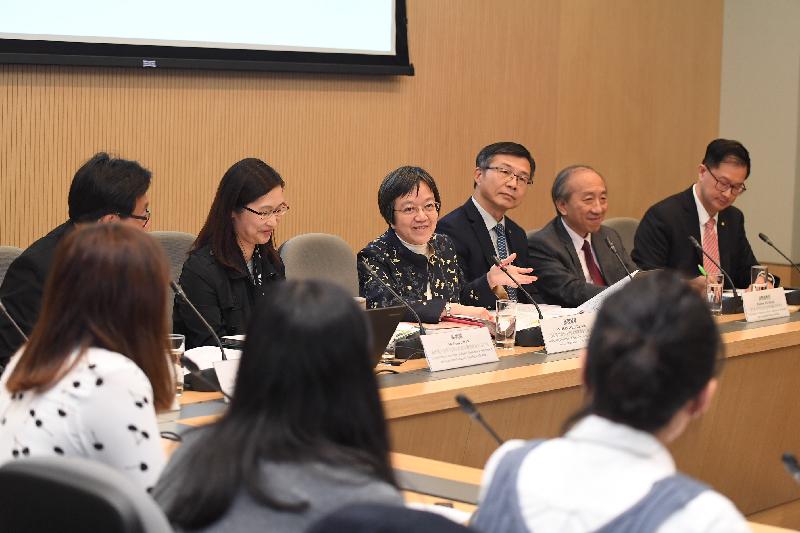EDB accepts Committee's recommendations for arrangements for Primary 3 TSA in 2018 and beyond (with photos)
******************************************************************************************
An EDB spokesman said, "Having considered the Committee's recommendations, the Bureau has accepted its recommendations regarding the future arrangements for Primary 3 TSA, i.e. the territory-wide and school levels will be handled separately to further enhance the confidence of the education sector and the community in TSA."
The EDB will arrange Primary 3 TSA with an approach of "no student names, no school names, no collection of reports and selection of participants by sampling". Details are as follows:
(1) Selecting students to participate in the annual Primary 3 TSA by sampling:
* About 10 per cent of Primary 3 students from each public sector school and Direct Subsidy Scheme school are sampled for the Primary 3 TSA each year. To understand the overall learning performance of non-Chinese speaking students and students with special educational needs and provide appropriate support, a certain number of students from these two student groups have to be separately sampled for the assessment to meet the statistical requirements.
* Students' performance will only be counted as territory-wide data. Since only a small number of students in each school will participate in the assessment, school reports will not be provided.
(2) Arrangements made by the Hong Kong Examinations and Assessment Authority (HKEAA) for schools which would like their Primary 3 students to participate in the assessment and obtain school reports:
* In the review, the education sector generally agrees with the concept of assessment for learning. A considerable number of schools would like their Primary 3 students to participate in TSA and obtain detailed school reports so that they can draw reference from the analysis to improve learning and teaching in a focused manner. The HKEAA will cater for the needs of these schools and make arrangements to enable all Primary 3 students to participate in the assessment and to provide school reports.
* Schools with such plans may directly approach the HKEAA. The HKEAA will make relevant arrangements and issue school reports to schools directly. The EDB will not obtain school reports of individual schools from the HKEAA.
The EDB and the HKEAA will inform schools of the details of the arrangements next week.
"We believe the new arrangements will further make clear that the Government will not use the data from TSA to evaluate schools, and reaffirm TSA's original purpose and positioning as 'a low-stake assessment with emphasis on feedback'," the spokesman said.
Following a comprehensive, rigorous, systematic and evidence-based review in the past two years, the Committee concluded the experiences of the assessments in 2016 and 2017. It also collected views from different stakeholders, including school sponsoring bodies, school heads, teachers and parents via various channels such as questionnaires, focus groups, seminars and meetings.
The EDB thanked the Committee for its efforts in the past two years. In consideration of the future arrangements for Primary 3 TSA, the Committee has maintained an open mind in listening to different views. In addition to the perspectives of the education profession, the Committee has taken into account the community's understanding of TSA, the differences among schools in the use of assessment information to improve learning and teaching, and the community's perceptions of the existing arrangements.
The views collected in the course of the review reflected that most stakeholders acknowledge the function and importance of TSA in the EDB's improvement of curriculum/education measures, and in helping schools implement teaching in a more focused manner. The stakeholders also commented favourably on the four major enhancement measures: improving assessment papers and question design; enhancing school reports; strengthening professional support measures; and including a questionnaire survey on students' learning attitude and motivation. The EDB will implement these enhancement measures on a regular basis.
The Committee also made various recommendations, which the EDB will study carefully and implement as soon as possible. The recommendations include enhancing the assessment literacy of schools and teachers as well as their abilities to make good use of assessment information; strengthening support for schools; continuing the development of quality online learning-teaching-assessment resources; exploring greater transparency of data on students' performance; encouraging schools to organise parent education activities; and fostering the community's understanding of assessment literacy.
The spokesman said, "Under the concept of 'assessment for learning', follow-up work after assessment is an important part of the entire assessment system. In this regard, TSA school reports facilitate schools’ understanding of the overall performance of their students, and help teachers provide focused and timely feedback and follow-up work. The EDB will also offer various support and services to schools, including school visits, school-based support services and workshops on promoting assessment for learning, so that schools, after obtaining the assessment data, will enjoy appropriate support in enhancing the effectiveness of learning and teaching. From the perspective of the education profession, TSA is a set of objective tools to provide the Government with information at the system level to review the effectiveness of education policies and arrangements for curriculum planning."
The report from the Committee will be uploaded to the webpage later: (www.edb.gov.hk/en/curriculum-development/assessment/about-assessment/assessment-for-learning.html).
Ends/Friday, March 16, 2018
Issued at HKT 12:56
Issued at HKT 12:56
NNNN






